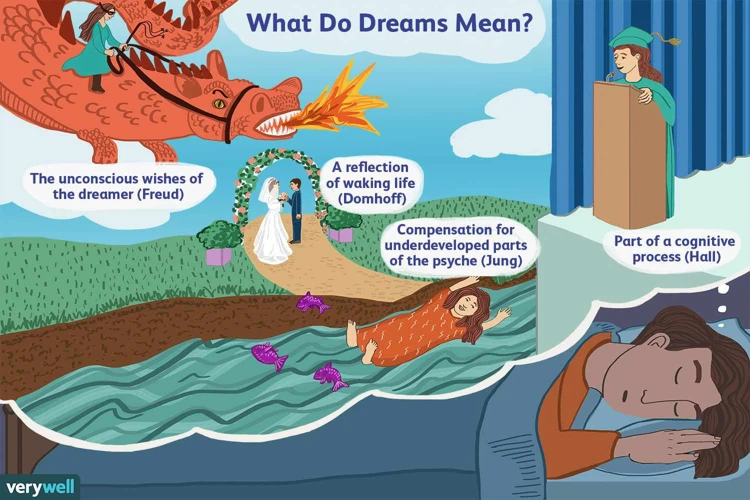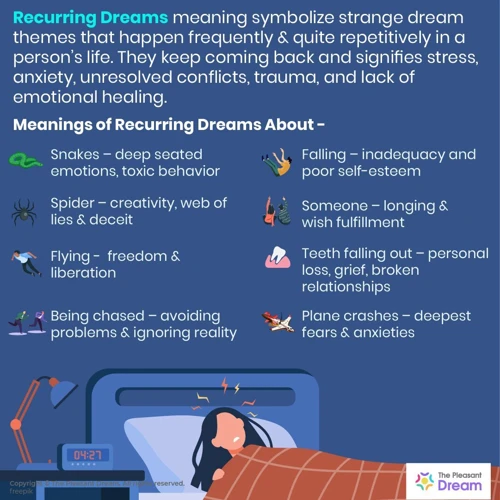Once we close our eyes at night, a mysterious world unfolds before us. Our minds embark on a journey called dreams, where reality merges with the surreal, and the subconscious comes alive. Dreams have captivated human beings for centuries, leaving us in awe and wonder as we try to unlock their secrets. In this fascinating article, we will delve into the depths of the dream realm and explore the different types of dreams that we experience. From lucid dreams that allow us to control our own narratives to chilling nightmares that leave us trembling in fear, each type offers a unique insight into the workings of our minds. Join us as we unravel the mysteries and embark on an exploration of the different types of dreams that captivate and perplex us all.
The Basics of Dreams

Dreams are enigmatic experiences that occur during sleep. They can manifest as a series of images, emotions, and sensations that feel incredibly real. While the exact purpose of dreams remains unknown, experts believe that they serve as a way for our brains to process and organize information. During REM (rapid eye movement) sleep, the stage of sleep when most dreaming occurs, our brain activity resembles that of being awake. This suggests that dreams play a vital role in our cognitive functions and emotional well-being. Dreams can be fleeting, with vivid details fading away upon waking up. To better understand the various types of dreams and their meanings, it is essential to explore their intricacies and unlock the mysteries they hold.
Types of Dreams

Dreams come in various forms, each with its own unique characteristics and meanings. One intriguing type is lucid dreams, where the dreamer becomes aware of their dreaming state and can actively participate and control the dream environment. On the other end of the spectrum, we have nightmares, which are unsettling and often distressing dreams that can leave the dreamer feeling fearful and disturbed upon waking. Another common type is recurring dreams, where the same or similar dream scenario keeps happening over time. Prophetic dreams are particularly captivating, as they seem to offer glimpses into the future, providing insight and anticipation. Meanwhile, false awakening dreams can be especially perplexing, as they create the illusion of waking up, only for the dreamer to realize they are still in a dream. Lastly, healing dreams offer solace and a sense of restoration, providing emotional or physical healing to the dreamer. It is important to explore and understand these different types of dreams, as they can offer valuable insights into our subconscious minds and contribute to personal growth and self-awareness. Click here to learn more about the symbolic meanings of dreams involving mirrors.
Lucid Dreams
Lucid dreams are a fascinating phenomenon in which the dreamer becomes aware that they are dreaming while still in the dream. This state of consciousness allows individuals to have control over the dream narrative and actively participate in shaping the dream’s events. It is a thrilling experience that can be harnessed to explore the depths of one’s imagination and fulfill desires that may be otherwise impossible in waking life. People who have lucid dreams often report a sense of empowerment and exhilaration as they navigate through their dreamscapes. Techniques such as reality checks, meditation, and keeping a dream journal can enhance one’s ability to have lucid dreams. Whether it’s flying through the clouds, morphing into different forms, or exploring fantastical landscapes, lucid dreams provide a limitless playground for the mind to explore. For those interested in delving deeper into the meaning and benefits of lucid dreams, they can check out our article on the spiritual significance of iron nails in dreams.
Nightmares
Nightmares are intense and distressing dreams that evoke feelings of fear, terror, or anxiety. They often occur during REM sleep and can leave a lasting impact on the dreamer. Nightmares can be triggered by various factors such as stress, trauma, medications, or even certain foods. These vivid dreams can feature scenarios that range from being chased by unknown entities to being trapped in dangerous situations. While nightmares are typically negative in nature, they can serve as a way for our minds to process and deal with underlying fears and emotions. The content of nightmares can vary from person to person, and understanding their symbolism and meaning is crucial for personal growth and emotional well-being. Exploring the causes and interpretations of nightmares can help individuals find ways to overcome their fears and find peace in their dreams.
Recurring Dreams
Recurring dreams are a fascinating aspect of the dream realm. These are dreams that occur repeatedly, often with similar themes or patterns. Many people experience recurring dreams throughout their lives, and they can leave a profound impact. These dreams often carry a message or meaning that the subconscious is trying to convey. They can indicate unresolved issues, fears, or desires that need attention. For example, dreaming of falling from a great height repeatedly may symbolize a fear of losing control or a sense of insecurity in waking life. Exploring the symbolism and emotions within recurring dreams can provide valuable insights into our subconscious minds. By keeping a dream journal and analyzing the recurring themes, patterns, and symbols, we can begin to unravel the hidden messages that our subconscious is trying to communicate to us.
Prophetic Dreams
Prophetic dreams, also known as precognitive dreams, have fascinated individuals for centuries. These dreams are believed to provide glimpses into future events or situations, often appearing vivid and detailed. People who experience prophetic dreams may find themselves accurately predicting future occurrences or encountering deja vu moments that align with their dream experiences. While the scientific explanation for prophetic dreams remains uncertain, many believe that they are a result of the subconscious mind picking up on subtle cues and making connections that the conscious mind may not be aware of. Some common themes in prophetic dreams include seeing symbols, receiving important messages, or even encountering specific names that hold significance. Click here to learn more about the meaning of names in dreams. Prophetic dreams continue to perplex and intrigue us, encouraging us to explore the depths of our unconscious minds in search of hidden insights.
False Awakening Dreams
False Awakening Dreams are a perplexing type of dream experience where the dreamer believes they have woken up from sleep, only to discover that they are still trapped in the dream world. These dreams often mimic our waking reality so convincingly that it becomes challenging to differentiate between the dream and actual awakening. In a false awakening dream, individuals may go about their regular morning routines, such as brushing their teeth or getting dressed, only to suddenly realize that they are still dreaming. This repeated cycle of false awakenings can be disorienting and may cause feelings of confusion and frustration. False awakening dreams can also be accompanied by a sense of unease or even a lingering fear. Understanding the nature of false awakening dreams can help us navigate and distinguish them from our waking reality, preventing unnecessary confusion upon true awakening.
Healing Dreams
Healing dreams are a fascinating aspect of our dream world that can provide solace and inner healing. These dreams often occur during times of emotional distress or physical illness, offering comfort and guidance. They can be characterized by their positive and uplifting nature, leaving us with a sense of peace and rejuvenation upon waking up. Healing dreams can take various forms, such as being surrounded by healing energy, encountering supportive individuals, or experiencing profound insights and resolutions. They have the power to provide emotional release, insight into our inner struggles, and even physical healing. Embracing and exploring these dreams can contribute to our overall well-being and inner growth.
Interpreting Dreams

Dreams have fascinated humans for centuries, and one of the key aspects of exploring their depths is interpreting their meaning. While dreams are highly personal and can vary from person to person, there are some common techniques for interpreting them. One approach is to analyze the symbols and imagery present in the dream. Certain objects or situations may hold deeper meanings or subconscious messages. It is important to consider the emotions and feelings experienced during the dream, as they can provide insight into underlying thoughts and desires. Another method is to keep a dream journal, recording dreams immediately upon waking up to capture details and emotions. This can help identify recurring patterns or themes over time. Additionally, seeking the guidance of a professional dream analyst or practicing self-reflection can offer further understanding of the messages hidden within our dreams. Remember, dream interpretation is a subjective process that requires introspection and exploration to uncover the personal significance of each dream.
Common Dream Symbols

Dreams often communicate through symbols, using images and objects to convey deeper meanings. Understanding common dream symbols can provide insight into our subconscious thoughts and emotions. Here are some examples of frequently encountered dream symbols and their potential interpretations:
1. Water: Water symbolizes emotions, representing the depths of our feelings, whether calm or tumultuous.
2. Flight: The ability to fly in dreams often symbolizes freedom, a sense of liberation, or the desire to escape from a particular situation.
3. Animals: Animals appearing in dreams can represent various aspects of our personality. For instance, a lion may symbolize courage and leadership, while a snake can symbolize transformation or hidden fears.
4. Death: Dreams about death are not usually literal but often symbolize change, transformation, or the end of a phase in life.
5. Money: Money in dreams can represent our values, self-worth, or the desire for material abundance.
6. Running: Running in dreams can symbolize a sense of urgency, the need to escape, or the pursuit of goals.
Remember, the interpretation of dream symbols is highly subjective and can vary based on personal experiences and cultural backgrounds. It’s important to consider the context and emotions associated with the dream to gain a more accurate understanding of its meaning. For further exploration of dream symbolism, visit our article on iron nail dream meaning.
Methods to Enhance Dream Recall

Enhancing dream recall is an effective way to gain insight into the subconscious realms of our mind. Here are some methods to help improve your ability to remember and recall dreams:
- Keep a dream journal: Write down your dreams as soon as you wake up. This helps in solidifying the memory of the dream and capturing details that may otherwise be forgotten.
- Create a bedtime routine: Set the intention to remember your dreams before you sleep. Repeat positive affirmations or visualize yourself waking up and recalling your dreams in the morning.
- Avoid alarm clocks: Sudden awakenings can disrupt dream recall. Try to wake up naturally without the aid of an alarm clock to allow yourself enough time to recall your dreams.
- Practice mindfulness: Engage in meditation or deep breathing exercises throughout the day. This helps to heighten awareness and improve overall dream recall.
- Stay hydrated: Dehydration can negatively impact dream recall. Drink plenty of water throughout the day to keep your body and mind in optimal condition.
- Set a consistent sleep schedule: Establishing regular sleep patterns can improve dream recall. A consistent sleep schedule helps train your brain to be aware of your dream state and enhances your ability to remember them.
- Avoid alcohol and certain medications: Alcohol and some medications can hinder dream recall. If you’re looking to remember your dreams, it’s best to avoid substances that may interfere with the clarity of your dreams.
By incorporating these methods into your daily routine, you can enhance your dream recall and gain deeper insights into the mysterious world of dreams.
How to Induce Lucid Dreams

Lucid dreaming is a captivating phenomenon where the dreamer becomes aware that they are dreaming and can exert control over the dream narrative. It offers a unique opportunity to explore and manipulate the dream world while fully conscious within the dream state. If you’re intrigued by the idea of experiencing lucid dreams, there are several techniques you can try to increase your chances of having them. One effective method is reality testing, which involves regularly questioning your reality throughout the day to build a habit of questioning it in your dreams as well. Another technique is to keep a dream journal, where you record your dreams in detail upon waking up. This practice helps improve dream recall and increases your overall awareness of the dream state. Additionally, practicing meditation and visualization exercises before bed can also enhance your ability to have lucid dreams. By incorporating these techniques into your routine and maintaining a consistent sleep schedule, you can increase the likelihood of experiencing the fascinating world of lucid dreaming.
Understanding Nightmares

Nightmares are intense and unsettling dreams that can leave us feeling distressed and fearful upon waking up. Unlike other types of dreams, nightmares are characterized by their negative content, often involving situations that evoke fear, anxiety, or trauma. These vivid and disturbing dreams can vary in theme and imagery, ranging from being chased or attacked to encountering supernatural beings or experiencing a personal tragedy. Nightmares can be influenced by various factors, including stress, trauma, medications, or even certain foods before bedtime. While nightmares can be distressing, they can also provide valuable insights into our subconscious fears, unresolved emotions, and hidden anxieties. By understanding the underlying causes and symbolism of nightmares, we can begin to address and potentially overcome these fears, leading to a better quality of sleep and inner peace.
Exploring Recurring Dreams

Recurring dreams are a fascinating phenomenon that many people experience. These are dreams that occur repeatedly, often with similar themes, settings, or narratives. They may revisit unresolved emotions, past traumas, or even highlight certain patterns in our lives. Exploring recurring dreams can offer valuable insights into our subconscious minds and provide an opportunity for personal growth and self-reflection. These dreams can be highly vivid and emotionally charged, leaving a lasting impression upon waking. Some common themes in recurring dreams include falling, being chased, or being unprepared for an exam. By keeping a dream journal and noting patterns, symbols, and emotions associated with recurring dreams, we can begin to unravel their deeper meanings and uncover the messages they hold for us.
Unraveling Prophetic Dreams

Prophetic dreams have long fascinated people with their alleged ability to predict future events. These extraordinary dreams offer glimpses into what may come to pass, leaving individuals perplexed and in awe. Some believe that prophetic dreams are a result of our subconscious mind piecing together subtle clues and information that our conscious mind may have missed. Others view them as messages from a higher power or the universe. Regardless of the origin, interpreting prophetic dreams can be a challenging task. The symbolism and imagery in these dreams often hold hidden meanings that require careful analysis. While many dreams may seem prophetic in retrospect, distinguishing a genuine prophetic dream from a mere coincidence can bewilder even the most seasoned dream interpreters.
Debunking False Awakening Dreams
Subscribe to Our Newsletter
Sign up to receive the latest news and updates.















